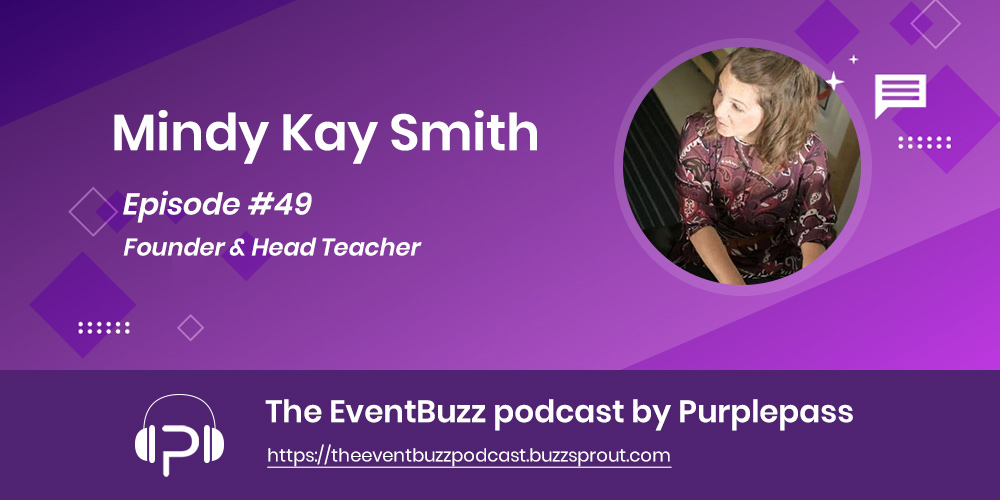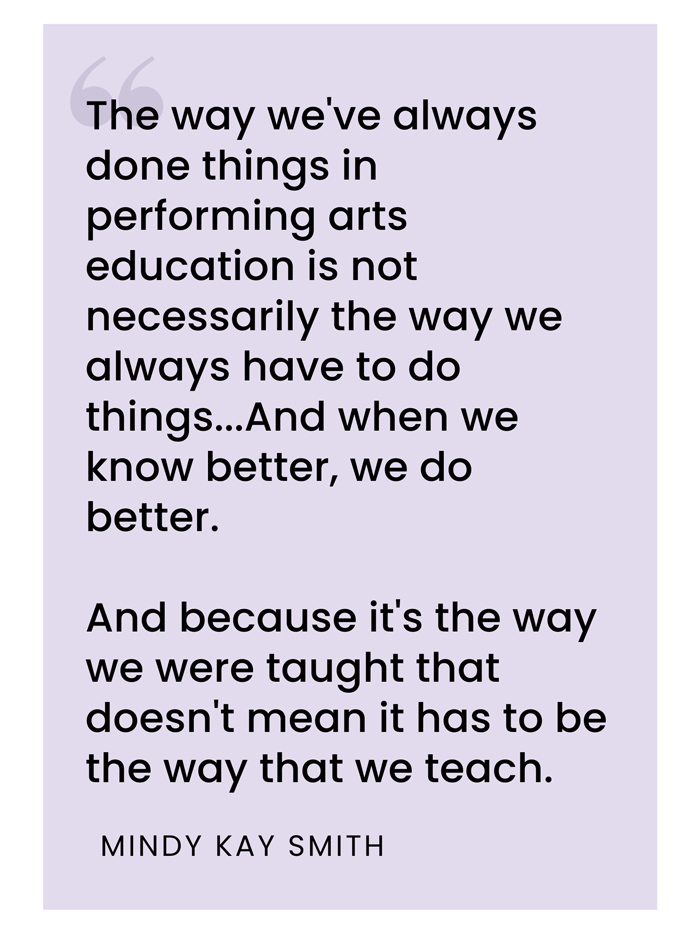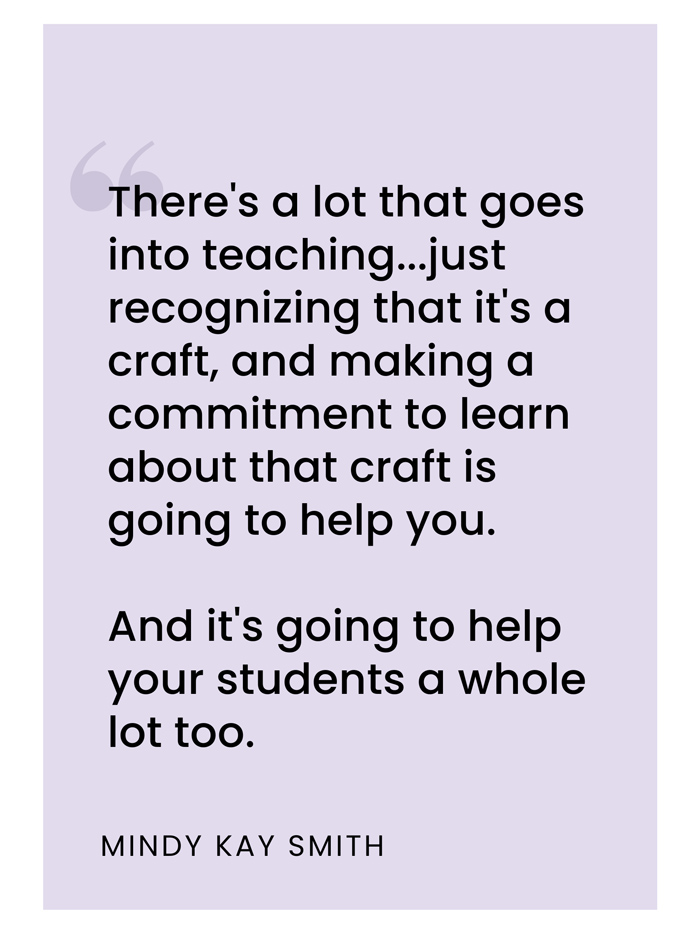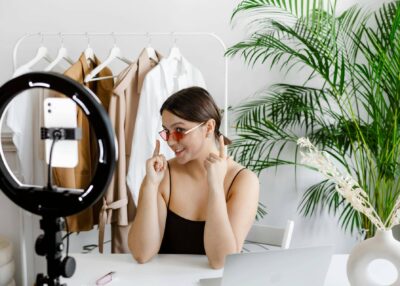Teacher's Advice for Performing Arts Productions and Educational Tips!

Podcast speakers: Savannah McIntosh (Purplepass Marketing Director) and Mindy Kay Smith (Founder and Director of Momentum Music and Arts, Head Teacher). Jump to the show notes below.
The EventBuzz podcast: Mindy Kay Smith
presented by Purplepass
Show Notes
Topic markers:


Podcast Transcript: Purplepass + Mindy Kay Smith
Savannah (Purplepass):
This is the EventBuzz podcast, a show where we speak to industry leaders in the event space around the world. For more than two decades. Today's guest has been teaching voice students from beginning to Broadway, piano students from preschool to adult and theater classes in public schools, colleges, professional companies, and after school programs. Recently, she has expanded her offerings to include mentoring current and future teaching artists.
So let's welcome to the show. Mindy K. Smith.
Hi, Mindy, welcome to the show. And thanks for joining us today. How are you doing this morning?
Mindy Kay Smith:
I'm good. Thanks. It's a little chilly in Ohio. But other than that, I'm good.
Savannah:
Oh, yeah. Well, I'm in Washington. And it is pretty chilly here too. It's finally starting to get a little a little cooler. But it feels nice. And I'm enjoying it.
So why don't you tell me a little bit kind of two listeners to obviously about yourself and how you became, you know, got to where you are today?
Mindy:
Sure. So I am originally from Ohio. I started playing the piano when I was five or six. Music is something that was in my family, something that I took to pretty naturally very easily became a big part of my identity. I ended up then majoring in Music Education at Ohio University. Stayed and get my Master's in secondary education. And I met my husband in the marching band, we went on to his small hometown where I was hired as the local music teacher, I taught choir, I was assistant marching band director.
And so it seems like all roads are kind of pointing to, I'm going to be a music teacher in public schools for the rest of my life. And it was just not a great fit. The culture of public schools were not a good fit. I got very, very frustrated. And he was a little frustrated in his job as well. And so we became those people who quit our jobs and sold all of our belongings and moved to New York City.
Savannah:
Fun.
Mindy:
So yeah, yeah, we actually did that. And so then we said, Alright, if we're going to do this, let's really do it. And so I went back to school, I went to NYU, and got my master's in musical theater. So I got a second master's. Because if we were going to sell all of our possessions and quit our jobs and start over, like, let's really commis Yeah, so let me go to one of the top programs in the country and, and so he went to the School of New York, the New York School of interior design.
Savannah:
Wow.
Mindy:
And we did the full time artist thing with most people in Ohio, kind of, you know, shaking their heads, and you'll be back in a year. That sort of general idea and we did come back, we came back after 17 years of both being full time artists. So I found that I was much more comfortable doing my own thing. I assumed when we left Ohio that I didn't want to teach. And it wasn't that I didn't want to teach, it was that I didn't want to teach in public schools. And so I ended up teaching as an adjunct at NYU, I taught as an adjunct at another college and then I sort of went from there private studio, after school programs, that sort of thing.Yeah and that has that has continued through today. That that's now what I do full time.
And in fact, we I mentioned when it was just us talking that we also homeschool. So I've now gone even further into the radical educator side of things, and kind of wanting to blow up the whole system, not literally just the system just systemically. Yeah, that was the super fast forward version.
Savannah:
That's amazing. That's a that's actually a really cool story. And I think it shows a lot of people that if you need to change like you can you're not, you're not stuck and routed to like, you know, one thing your whole life.
Mindy:
Oh 100% And my husband and I both grew up in very traditional Midwestern household households, very traditional. And we were the two I don't know if we happen to find each other in the universe, or if we came to this together or or what it was, but we've just really had our own path since then. From being an adoptive family to being freelancers to homeschooling. All things that are pretty non traditional.
Savannah:
Yeah. Well, I like that I like going against, you know, the tradition sometimes and having people be like, you know, kind of look at you like, you're weird, but it's just like, I'm doing what I'm doing.
Mindy:
Yeah, it's something that we as a family have to really stick together in, because there's a lot of what do you mean, you don't have a full time job? What do you mean, you don't send your child to public school?
Savannah:
Yeah. Awesome. That's so cool. Well, that's perfect. Because today, of course, we're going to be talking about, you know, teachers and trying to get as much as as much as advice as I can from you when it comes to, you know, the education aspect and working with students. So, one of the first questions that I did want to ask you, because I know talking to you separately, you kind of mentioned the production aspect, but you said, planning, like, kind of like a one man band like you were doing everything.
So I wanted to ask if there was any advice that you would give other performing arts teachers out there that have like minimal to no help when it comes to kind of coordinating productions?
Mindy:
Yeah. I mean, my first piece of advice is, don't do that, if you can. Ideally, don't do that. But there are times that you just there's no choice. You know, I have a strong partner, first of all, who if I mean, in my husband, who a lot of times just by default, is sort of doing things in the background.
But having a really strong plan ahead of time, I've now done it enough, that I know sort of the order of things, and I love a spreadsheet, and I love a list. And as much as we're artists, and that's really important to be bringing that to the table, you need to be really organized, if it's going to be just you on your own. And so to sit down ahead of time, and you know, how long are these things gonna take? How much is this gonna cost? Can I make a guess? And then the more you do it, the more accurate those those steps and numbers become.
Savannah:
Yeah, that's what I was going to ask is like staying organized. Because I think that is, you know, what would help get you through that? I love spreadsheets.
Mindy:
Yes. Like, I love love a spreadsheet. I love a calendar. I love a list.
Savannah:
Yeah. And then what what would you give advice for maybe new, like, teachers listening to this and just starting out as well. Just worried about making an impact on their students education, what would you kind of tell them like going into this?
Mindy:
Yeah, so it's interesting, the way that I started, the teaching field was really special. I was part of a Teaching Fellows Program. And so right after I graduated with my bachelor's, two days later, I started grad school, also at Ohio University. And I was able to be a part of a program where we took classes pretty intensely over the summer. And then starting in the school year, we worked with a mentor teacher.
So we were there for a half a day, I would teach first period, he would teach second period, third period, we team taught fourth period, we both had a plan. And it was a way to really ease myself into teaching and have this strong relationship. And that just doesn't exist. It was amazing that I got to start my career that way. But it doesn't exist.
And so the number one thing is to have a mentor, whether it's someone else in your building, someone else, anywhere in the world online. I actually last year about this time, just because of several online forums that I was part of saw kind of the same questions coming up over and over and over. And I ended up starting a Facebook group just for new teachers, new performing arts teachers, and had a few of my friends that were all more veteran performing arts teachers on hand. And I was like this way this group is for you to ask questions. No, no, no question is too small. If you just need to vent that's also okay. But those mentorships are so important because what you learn in college can be very important. It can be very relevant, but it's is not the same as the day to day.
So that would be the first thing is finding a mentor. But the second thing is, there are a lot of teachers, especially in performing arts, who don't necessarily have a background in education. And so in a lot of places, you need to have that certification. But in places that's changing. And so on the one hand, you do not necessarily need i know that i there could be some backlash for this. But even as a person who does have advanced degrees in education, you do not necessarily need a degree in education to be a teacher.
However, you do need to acknowledge that it's its own craft. And so rather than well, I was an actor growing up. So I'm sure I can teach these young people to also be an actor. You probably can. But acting is its own craft, just like those actors wouldn't love if somebody said, well, you're pretending right? So I can I can pretend?
Well, no, there's a lot that's quite into it. There's a lot that's going into teaching. So just recognizing that it's a craft, and making a commitment to learn about that craft is going to help you. And it's going to help your students a whole lot too.
Savannah:
Yeah, I think those are excellent points, and especially the mentorship to with Facebook. Honestly, there are groups for everything I love. I'm not a big social media person. But like Facebook groups are so nice, because there's just something for everyone.
Like you said too whether it's looking for information or just venting or finding, you know, that those group of people in your industry. So, yes, very important. And also, like I wanted to say now, before I forget and do not say it to every teacher out there, whatever, you know, industry, you're in whatever you're teaching, like props to all of you guys, because teaching is not easy. And I feel like over the years, it's just gotten so much harder. And there's just not enough support, obviously, I'm sure you know, and all the teachers listening to it for teachers out there. It's yeah.
Mindy:
That's something I think about really often. Because as a person who has, you know, radical educator, as the first thing on my Instagram profile, and constantly be talking about, you know, how public schools didn't work for me and how we homeschool. And in fact, we unschool. And my biggest worry in all of that is that some teacher somewhere is going to think I mean, that I'm not in support of them.
And that is the absolute opposite.
It's that the system, the larger system has changed so much that I don't know how so many good teachers have hung in there. And if they don't hang in there, then what about all of the kids who don't have a mom who can say, that's all right, we'll just pull you from the system and homeschool. You know, and it's so important that they know how supportive they are, and how important their job is, even though it just gets harder every day.
Savannah:
Yeah, yeah, I have a lot of friends who are teachers and substitute teachers and just working that the industry and just love, like what they're doing. But it's just so hard. It's not easy thing. It's just, they're amazing. Like, because they're making such they're so important, like you're so important, but there's just not acknowledged enough by like you said this system and yeah, so, but props and appreciation to all of you guys, because you guys are just impacting so many students lives. And it's just so important. The role is so important. So it really is. Yeah,
Mindy:
Thank you.
Savannah:
Yes. So I did want to ask a little bit about the production aspect of putting on events, working with students one being hybrid events, just because those are becoming more and more popular, obviously, especially after COVID. They've kind of stuck and people like doing those models. I didn't know if you've had experience with them. And if you did, would you kind of how was that experience? Would you recommend that event model for performances?
Mindy:
Sure. I've done it a few times. You know, I was in it felt like a strange situation because all of it was strange, but I don't know that it was that unusual just to me as an artist. COVID is when we decided to leave the New York City area.
So we were part of that kind of mass exodus of artists. That was the time that we chose to move back to Ohio. And so we had been thinking of moving home for a long time. But it's really difficult when you have sort of this client base for my husband and student base for me to just pick up and start over. And when everything went online, we said, well, we might as well at this time, if it doesn't matter where your computer is, you know, let's take this time to make the shift.
And what that created for me was new students here in Ohio, with some of my former students back in Connecticut in New York. And some of them are still with me now. And so, as I would do these recitals, at first, it was just a fully online recital, everyone was online. And then finally, we got to a point where we could do some in person things. But I didn't want my Connecticut and New York students and I actually have students now who are all over the place to be left out. And so that's where that hybrid model came from.
So we would do an in person recital, while having the people who were not on site there. You know, join us through zoom. The one piece that I found, really made, the difference was that if the performance was virtual, the performance itself was not happening in real time. That element was beyond, even when we started to watch, you know, talk shows, trying to do things virtual at the very beginning, or, you know, all all of the fundraising performances that happened, there was a big difference, even when the world's experts were on it, between the ones that were previously recorded, and we were sharing it together in real time, as opposed to the performance be in real time.
And so I would have my students who were not able to be there, record their performance. And then I would share it in the room with the people who are in the room, and, you know, online with those people. So we were experiencing it together, if that makes sense. And so that is something that helped a ton.
I also did one at Ohio University. Last year, we had a master class. And so that was a similar situation where the performance was happening. Live, the pianist and the singer were in the same room. But the teacher who was with us was, yeah, in some other location, some remote location. So yeah, for as much of the elements to be happening in person live as possible, without trying to jump now there are people there are ways to do it. There are very advanced technology, you know, but just for me, doing as much of that in the same room as possible. And then pre recording things.
Savannah:
Yeah, yeah, that makes sense. That just, I remember when they started doing that, with during COVID and stuff. And it was so cool, because they were able to collaborate with so many different artists. But I remember thinking, like the coordination that went into that, especially when they were all live and all different locations like man.
Mindy:
Yes. And for making music. There's honestly, yes, the technology has gotten better even over the past few years. But even the most professional of the most professional, it's not quite the same. Yeah, people making music who are not in the same space. So if there are people who are like, why can't I make this happen? It's not that you can't make this happen. It's that the technology just isn't quite there yet.
Savannah:
Yeah. Yeah. No, that's a good point. I just wanted to bring up that question. Because, like I said, I just feel like that model is becoming more and more used.
Mindy:
It is and it's also a great way for, you know, grandparents can now Yeah, watch the recital, even though they live in California or whatever the case may be. It includes more people. Yeah, it's, it's great.
Savannah:
I think it's great to especially if you have someone that is sick or immunocompromised, like they can still be a part of that as well, which is really important. So yeah. And I also wanted to mention I think talking to you and looking on your Facebook, you have your own podcast as well, correct?
Mindy:
I do it is called Teaching Artistry.
Savannah:
Yeah, I wanted to shout out to that. And make sure I mentioned that here. So people listening can continue on getting more tips and advice from you, if they want specifically for, you know, the educational practices, and whatnot. So I'll also have you send me a link to that. And I'll link that in the show notes below.
So people can...
Mindy:
Yeah, thank you. Yeah, that would be great. My it's, it's largely for performing arts educators. But it's not only for performing arts educators, because I also want to encourage classroom teachers to be more comfortable using Performing Arts in their classes.
Savannah:
Oh, yeah. Yeah. So I will go ahead and link that I wanted to make sure I asked you that before we ended our conversation, because that is also important. And before we go, again, thank you so much for coming onto the show and talking about this.
Is there anything else you would like to add for our listeners? And, you know, teachers out there listening?
Mindy:
Yeah, I think just that the way we've always done things in performing arts education is not necessarily the way we always have to do things. And that things are changing. And when we know better, we do better. And looking at things like trauma informed education, and realizing that some of the ways, especially in theater that we were trained, is not necessarily the healthiest.
And because it's the way we were taught that doesn't mean it has to be the way that we teach. And so to really examine why we do some of the things that we do, and if there is room for change in that.
Savannah:
Yeah. And honestly, that applies to so much in life, like taking that moment to be like, what, why do I do this? You know...
Mindy:
Do we need a 40 hour workweek? Do we have to go in exactly all of the things that we are, we're forced to examine? Yeah, yeah. Let's lean into that.
Savannah:
Yes, that's so important. I think we're, as a society, we're, we're, we're doing that finally, like we're slowly being like, like you said, Why am I working all my life? Like, why am I sitting here just working until I die? Like, what is the point and I think it's so important to ask these questions and know your value and know that your ideas also matter.
Mindy:
Yes, absolutely. Awesome.
Savannah:
So thank you again, for coming onto the show. I really appreciate it and I'm excited to just get this out there and and share it.






